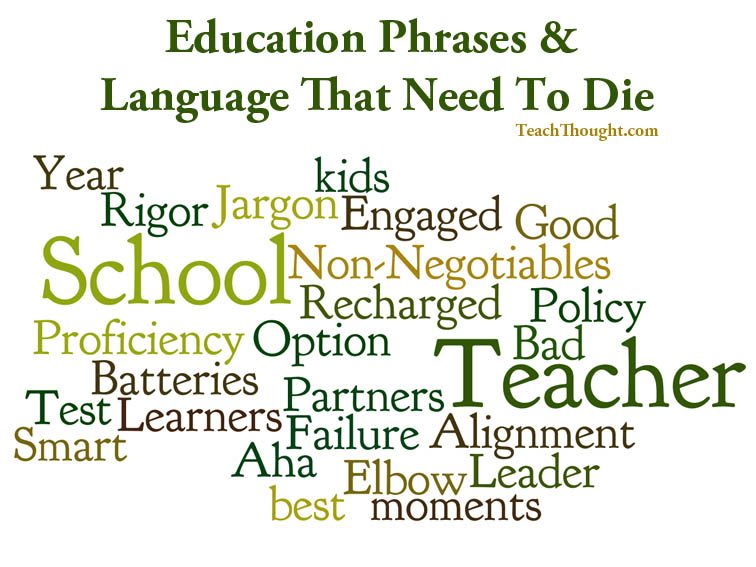
Education Phrases & Language That Need To Die
by Terry Heick
Being in education long enough, you’ll begin to hear certain words and phrases that bother you on some level.
Some are obvious—“smart” bothers a lot of educators, and for good reason. Others you’re not sure why they grind your gears, but they do. (I know, right?) So below I thought I’d pile a slew of them together so we all could be annoyed together.
Let me know on facebook what I missed.
‘Aha moments’
Pet peeve. Can’t explain. Just please don’t tell me about your aha moments, or respond with “I know, right?” if I choose to share mine.
Non-Negotiables
Implies teachers aren’t going to do certain things unless they’re “not negotiable.” Barely helps with those teachers the phrase was coined for, and can send the wrong message to those who were doing it all anyway.
Teacher Leader
All teachers should be leaders. Phrases like this imply a hierarchy among teachers while letting those content to sit in the background off the hook.
Teacher of the Year
Far too subjective. Also sends the wrong message to staff.
Rigor
This one is a bugger because I love the concept, but it’s so often misused as to be abused. (Read “Teaching What Matters Most” by Silver, Strong, and Perini.)
Batteries Recharged
This one is always fun. The night before returning to school after two weeks off—or even two days—you get an email warning you of the tremendous challenge to come, and hoping your “batteries” are strong enough to survive the onslaught.
Who doesn’t want a piece of that?!
Alignment
Please be aligned with the standards. Or rather standards-driven.
Also, align yourself with school expectations and district non-negotiables.
You also need to be aligned with guidelines of professional conduct at all times. (Of course!)
And please align yourself with other teachers in the same grade level in your content area. (This is horizontal alignment.)
And check for alignment with other teachers in different grade levels in your content area. (This is vertical alignment.)
And once you’re professionally, horizontally, and vertically-aligned with standards, schools expectations and district non-negotiables, be creative, spontaneous, and charismatic enough to “engage learners” and spread proficiency like a virus!
“What’s best for the kids…”
Too easy to hide mediocre thinking or problematic policy behind this feel-good phrase.
Engaged Learners
Looking for “engagement” sets the bar pretty low, doesn’t it? Eye contact and 4 raised hands may not be a reason to celebrate.
Proficiency
No comment.
Smart
Do you mean academic smart—as in, can read new material well and answer comprehension questions accurately?
Do you mean can grapple with difficult questions for long periods of time, and always ask a better question in return?
Do you mean resourceful and driven by the right thinking habits?
Do you mean a creative visionary able to conjure visuals, concepts, and designs out of thin air?
What is often meant by “smart” means “good at the game of school.” Let’s find new language.
Policy
Policies are vague, general rules to manage situations that require specific, careful thinking. And they’re everywhere in education.
Elbow Partners
No explanation on this one either. Just annoys me. Too many meetings?
Good School
Measured how?
And then this useless label gets tossed around in communities by well-intentioned families just trying to help their children get the best education possible.
And worse, it implies the opposite: bad school. That’s like saying “bad city,” or “bad family.” And making these kinds of judgments can often serve to help “good schools” know exactly how to tidy themselves to keep that shaky label, like a restaurant kitchen knowing when the health inspector’s coming and what they’re going to check when they get there.
Failure is not an Option
This one’s in my wife’s signature, so I see it every time she emails me from school. More of that teeth-gritting rhetoric that keeps us focused more on “effort” than rethinking how we do things. I’d make fun of her, but happy wife, happy life, right?

